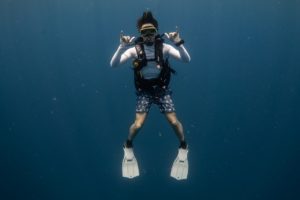Our world-leading marine research underpins a wide range of undergraduate and postgraduate programmes. In our MSc Graduate in Focus series we look at the achievements of our MSc graduates who have excelled in marine science around the world since studying with us. Today we chat with Christopher Wenham, MSc Marine Environmental Management graduate, who is now working as a Marine Planning Reform Lead Advisor for Natural England.
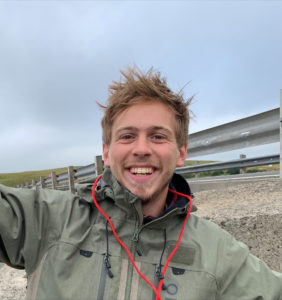
What have you been doing since you left Exeter, and what are you doing now?
Since graduating I began working for Natural England (NE) in November. I sit within Strategy and Government Advice where my role covers various aspects of the marine work NE carries out. I am currently involved within a team who act as liaisons between NE and the MMO. I lead on various internal process reforms associated with our marine consultations, and additionally run a network that provides a platform for broader discussions on how this sits in regard to legislation & policy. I have recently started working on various projects involved with designated sites and support my colleagues on work within marine planning and spatial prioritisation.
Why did you choose this career? And what do you enjoy most about your work?
I was drawn to the idea of working within the UK’s marine area and to gain experience within a governmental organisation. I really enjoy the variety of work I currently undertake. In my current role my work covers a range of topics: changing and new legislation, strategies such as BNG, (hopefully MNG in future), involvement in marine consultations, work with different industries and stakeholders and creating new guidance for exciting events such as the designation of HPMAs. I am continuing to learn so much and am surrounded by a fantastic team of supportive and knowledgeable individuals.
What did you enjoy most about your program/the University and what was the biggest highlight?
I thoroughly enjoyed the program; it was great to be surrounded with many like-minded people, with such a clear passion for the marine environment, I found to be constantly stimulated thought all the modules. The lectures and support provided by Callum Roberts & Julie Hawkins was fantastic, and Falmouth, what a place to study! Without a doubt the biggest highlight was the time spent in the Maldives. The field course provided valuable insight into coral reef ecosystems, it was amazing to be diving everyday and gaining practical field experience too!
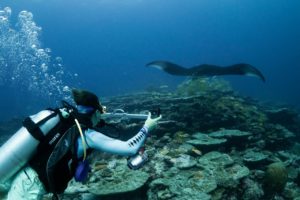
I was fortunate enough to undertake my thesis with the Manta Trust, for this I was based at Six Senses in Laamu Atoll, where the Manta Trust was based alongside other environmental NGOs. Throughout my time on island, I was able to collect the final data for my thesis, which focused on the seasonal variability and behaviour of Reef manta ray (M.alfredi) at cleaning stations in Laamu Atoll. This was done using a remote underwater photo system, in additional to other recording techniques; due to this I managed to spend more time underwater than on land! Results from my thesis project contributed information of M.alfredi behaviours and spatial use of the area, and aided in providing robust scientific guidance to decision makers of the area.
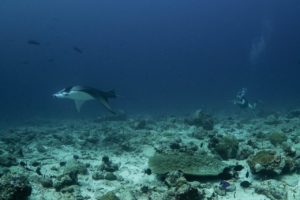
I was also able to undertake additional research for the Manta Trust including acquiring ultrasound scans of females presumed to be pregnant and taking width measurements using a stereo-video system to create a 3D image of the individual manta. I was additionally involved with collaborative work alongside the Maldives Underwater Initiative (MUI) a group of marine biologists associated with Six Senses Laamu, Blue Marine Foundation and Olive Ridley Project. I supported the team in coral translocations, night-time spawning dives and provided presentations and interactive sessions to guests.
This really was a once in a lifetime experience, throughout my month on the island I learnt so much working alongside other marine scientists, whilst building extremely valuable friendships as well as contacts. The work carried out by this group is a fantastic example of collaborative marine science within the Maldives. I understand these opportunities are not usually common, however, they have been made readily available to MSc students through the fantastic staff of Exeter Marine.
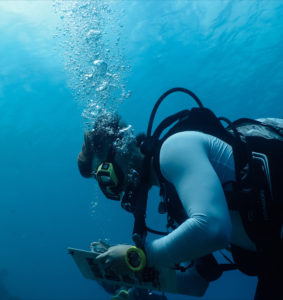
Why did you choose to study this course?
Off the back of studying my BSc Marine Biology at Penryn. I had wanted to further my knowledge within the management of our valuable marine ecosystems, and we can help recover, enhance, and create resilience within these areas. Inherently, I’ve always wanted to do my part for the environment, and with environmental concerns coming to the forefront of the public’s mind, this seemed like the best next step to allow me to achieve that goal. MEM provided a perfect opportunity to do so, covering a wide breadth of topics from understanding the complexities of protected area designation and management, to the management of fisheries and how these can be bolstered for the future. I was also attracted by the statistics and GIS modules which I knew were key skills to have.
What skills and experience have been most useful for your career?
The knowledge provided by my MSc and experiences has proved extremely useful in my career so far, helping provide context to both narrow and broad topics. I think, most of all, presentation and people skills have proved the most important. At the end of the day in many roles you are dealing with people, if you can communicate your ideas and build lasting relationships you will stand in good stead!
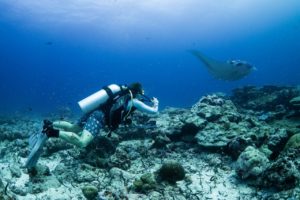
What advice would you give to a current student who wishes to pursue your career?
It is often hard to understand what it is exactly you want to pursue. Try as many things as possible, you will gain valuable contacts, knowledge, and insight to individuals’ careers. Always follow up on people too, a lot of the opportunities I have been fortunate to undertake I haven’t been offered first time around; often one email asking how your application could be improved can lead to fantastic opportunities!
Have conversations with your friends about different topics and ideas, it is great to see other perspectives. Be optimistic, open-minded, and attentive, I believe this is so important for the future of environmental work – we are the ones who have the opportunity to determine what direction it will take.
What are your plans for the future?
I am very keen to see where my current role progresses. I would love to travel with work and have taken interest to the government’s Blue Belt Program, it would be fantastic to work with our overseas territories.
